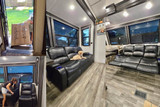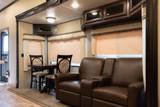Camp Hosting FAQ
It’s one of the first places you stop when you enter a campground to check in. That place is the site where the camp host can be found. It is the hosts who set the tone of your stay – if they are friendly, knowledgeable and helpful, your stay is off on the right foot. But a surly, impatient or temperamental host can ruin the stay for everyone.
A campground host really is the representative of the owner or operator. So, the first impression they give you is important. There are opportunities for RVers to become campground hosts and those opportunities provide some nice benefits, such as free or reduced campground stays, sometimes a small paycheck and other perks. It can be beneficial for all parties concerned if the fit is right.
While camp ground host does not usually refer to a paid employee or private campground owner, the camp hosts you find at state parks, historical sites and National Parks has a lot in common with you. Often these camp hosts are retirees, couples, or people who enjoy living and traveling in their RV.
First, they are also RVers. That means they understand what campers need and want. They have knowledge of RVS and usually have experience setting up a campsite and packing things up the next day. They know what can ruin a campground stay and they know what campers value.
They enjoy the RV lifestyle. Camp hosts are usually hired for long-term stays, at least several months. It is often seasonal, opening around Memorial Day and continuing until after Labor Day. That means they are committed to living in an RV for an extended period and that they are believers in the friendships and interaction they can enjoy while serving in their role as a camp host.
If this sounds like something that you might want to consider, the best thing to do is do your research. Talk to the camp hosts at properties you visit. The people in these roles already are likely to have a good perspective on both the positive and negative elements of the job. Take an honest look at what duties are required and whether you can perform these duties correctly.
While duties and responsibilities will vary from location to location, there are some common expectations. These include cleaning up the campground, including restrooms and common areas as well as individual campsites, and various tasks related to campground administration, such as checking guests in, taking payment, booking reservations, etc. Other duties may include enforcing rules and regulations. Or you might have to serve as a concierge and help campers find their way to tourist attractions in the area, places to purchase supplies or simply what’s happening locally that may be of interest.
Keeping the camp ground maintained may also be a duty of the host. That means mowing the lawn, planting flowers or trees and repairing buildings, fences or other structures. You might be called on to fix a plumbing problem or a clean up storm debris. The scope of duties will vary depending on the site.
Here are some other tips to help transition from camper to camp host.
Submit your application early – way before the season starts. These jobs are popular, and competition can be stiff, especially at some of the busier areas. Expect an interview or interviews, a background check and plan for enough time for this process to complete, perhaps as much as 8 or 9 months. Don’t forget to factor in the time it will take to relocate your rig for the contract period.
Get your questions answered. Prepare a list of questions about the job, responsibilities, benefits, etc. before you accept the job and even better, when you are interviewed. Will you be on call 24 hours a day? What will your daily duties be? Is there an expectation of a set number of hours you will need to work? Find out where the closest stores, gas stations, attractions, and hospitals are. What amenities are offered? How is cell phone or internet service at the site?
Put the details in contract form. Listing the duties and responsibilities, the hours required to be worked, and the agreed compensation, whether it is a free site or involves a wage of some kind, helps clarify the position and prevents disagreements. You want to be able to use your employer or co-workers as references for another job and having everything pertinent to the position is writing saves aggravation.
Brush up on your customer service and people skills. You will likely hear complaints from campers and be bombarded with the same question again and again. Being patient and friendly is a sure way to make the camper feel welcomed and appreciated. Even those who have complaints should walk away feeling their problems have been heard and addressed.
Don’t be a workaholic. Take time to get away from the campground and enjoy the location. When you are living in the place you work, it can be stressful and difficult to separate your free time from your work time. Camp hosting is supposed to add to your enjoyment of the RV lifestyle, not complicate it.
Weighs the pros and cons before committing. On the plus side, camp hosts have opportunities to make new friends with campers and coworkers, can help with conservation and preservation programs, and enjoy the facilities at parks and historic sites. On the other side, being a camp host means being away from family and friends for an extended time, there is the potential for conflicts with management, interacting with campers with poor attitudes, and even having to deal with situations that may involve illegal or even dangerous behaviors.
Becoming a camp host can be a great experience. For some, it becomes a way of life and the only way to enjoy their summers. Having a destination to go to provides stability and yet, satisfies that wanderlust. If it’s the right fit, the experience can be something you will continue to do for years to come.
Recent Posts
-
Traveling to the RV Hall of Fame in Elkhart, IN
If you are traveling to Elkhart, IN to see the RV Hall of Fame, getting off the toll road at exit 96 …Nov 14, 2025 -
Best RV Air Conditioners of 2025: An Expert Guide From RecPro
Quick Answers Best overall RV air conditioner: RecPro 15K Quiet AC with Heat Pump (RP-AC3800) Best f …Oct 29, 2025 -
The Nuclear Nomads Expand Sofa with New Recliner Section Install
The Nuclear Nomads are a full time RV family living in south Florida. Andi and Joey value quality ti …Oct 24, 2025 -
Trailer Wiring Guide: How to Wire Your Trailer for Safety and Efficiency
Table of Contents 1. Common Types of Trailer Connectors 2. Trailer Wiring Diagrams: Color Codes and …Aug 20, 2024 -
How to Keep Your Pets Safe While Camping
RVing and camping are a great getaway from the hustle and bustle of work and the city and the day-to …Jul 02, 2024 -
Why Replace Your RV Furniture?
You may wonder when is the best time to replace your RV furniture. There is no one right answer to t …May 20, 2024







